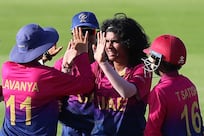KHARTOUM // Sudan voted on Monday in elections boycotted by the mainstream opposition that are expected to extend the quarter-century rule of President Omar Al Bashir.
With 15 little-known candidates running against him, Mr Bashir – wanted on war crimes charges – faces no real competition in the vote.
Voters will also elect national and state lawmakers in the three-day poll, with Mr Bashir’s ruling National Congress Party expected to dominate.
The elections have already been criticised by the international community.
There was a slow early turnout on the streets of the capital on Monday, after the government declared polling day a public holiday.
Mr Bashir, 71, arrived at the St Francis School to vote around 11am local time, smiling and waving as he entered the polling station with one of his two wives amid heavy security.
Journalists outnumbered voters.
In another school in Khartoum’s Al Daim district, only a few voters turned out early.
“I came here because the elections are the right to choose who governs me,” said 25-year-old Abdallah Mohammed Ali.
Around 100 policemen joined ordinary voters, piling out of trucks and minibuses to cast their ballots.
There was also a slow trickle of people voting in the eastern city of Port Sudan.
“I noticed very small numbers of people entering the centres” after visiting three around the port town, a resident said.
The elections are the second contested ballots since Mr Bashir seized power in 1989.
Mr Bashir toppled a democratically elected government in a coup and is Sudan’s longest-serving leader since independence.
He won a 2010 presidential election that was marred by an opposition boycott and criticised for failing to meet international standards.
Under his rule Sudan’s economy has faltered, suffering badly from South Sudan’s 2011 secession, which saw it lose nearly three-quarters of its oil resources.
Conflict has plagued South Kordofan and Blue Nile states since 2011, and the Darfur region since 2003.
Mr Bashir was indicted by the International Criminal Court in 2009 for alleged war crimes and crimes against humanity in Darfur, and the following year for genocide.
Some 300,000 people have been killed in fighting in the western region, according to the United Nations.
Rebels have said they will disrupt the elections across the three war-torn areas.
The Sudan People’s Liberation Movement-North, which is active in South Kordofan and Blue Nile, sees Mr Bashir’s potential reelection as the “continuation of war in Sudan and instability for the whole region”, its spokesman Arnu Lodi said.
Officials say voting will not take place in one district of Darfur and seven in South Kordofan, but will go ahead at some 7,100 polling stations nationwide.
The European Union has already said the elections cannot produce a credible result because Mr Bashir’s NCP snubbed a meeting with the opposition to organise a national dialogue last month.
Norway, the United States and Britain warned an environment conducive to “credible elections does not exist”.
Khartoum released two leading political detainees on Thursday, a move their lawyer said was aimed at easing international pressure.
Amin Makki Madani and Farouk Abu Issa were arrested in December for joining an an opposition alliance.
Human rights groups have accused security services of stifling dissent ahead of the elections.
Police in Port Sudan broke up a small student demonstration against the elections on Sunday.
Residents of the Kalma displaced persons’ camp in South Darfur held a peaceful protest at the headquarters of the peacekeeping force that provides their security.
The government has dismissed the criticism, with presidential assistant Ibrahim Ghandour saying the elections are “historic”.
A senior NCP official said there had been a “large turnout” so far.
Al Haj Adam, also a candidate for the national parliament, said the vote would have a “positive effect on the political arena”.
Forty-four parties are standing for the state and national parliaments in the country of nearly 38 million people, and 15 international organisations are observing the process, the National Electoral Commission (NEC) said.
The EU, which monitored the 2010 elections, declined to send a team. The results are expected in late April.
* Agence France-Presse




